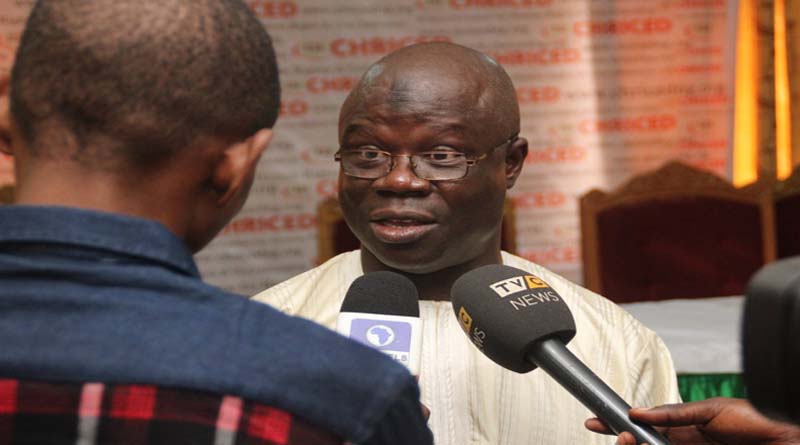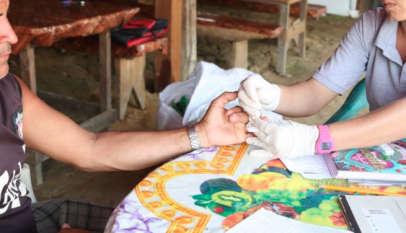Corruption and bad governance undermining welfare and well-Being of Citizens, By Zikirullahi Ibrahim

I bring you warm greetings from the Board of Directors and Secretariat of the Resource Centre for Human Rights&Civic Education (CHRICED). As a platform of active citizens working to promote democracy, human rights, and accountable governance, it is part of our historic responsibility to provide perspectives about the most fundamental concerns of citizens with respect to how the democratic and governance processes affect them.
We have done this consistently in the past, and will continue to do so for the good of our country. We know it for a fact that the entire machinery of governance stands the risk of being skewed in the favour of narrow and often corrupt interests of political actors, to the detriment of the welfare of the majority, if citizens do not speak up whenever those in public office engage in subversion of the primary purpose of government.
It is our conviction that as an organisation, CHRICED must carry the historic responsibility of speaking truth to power, at great risk and sacrifice, by refusing to remain silent in the face of the corruption, tyranny and oppression. These anomalies being perpetrated and abetted at the highest level of government have always undermined our progress as a country.
However, in recent weeks, a most scandalous assault on the psyche and commonwealth of the Nigerian people has enveloped our governance space. This state of affairs has prompted many citizens to wonder if there is indeed any hope for better days.
Others who have witnessed the emasculating effect of bad governance have recoiled into their shell, and have ceded the space to those who are bent on making our country a waste land. Notwithstanding this bleakness, we must continue to speak until the voices, which stand for truth, good governance and the best interest of our country, prevail.
Citizens Welfare and Well Being in the COVID-19 Situation
The serious social and economic disruptions caused by the outbreak of the Novel Corona Virus (COVID-19) indeed left the lives, plans, and projections of many citizens for year 2020 in disarray. There have been many heart-rending tales of sorrows, tears and death as the pandemic dealt a serious blow to businesses and livelihoods, while ending the precious lives of hundreds of our fellow countrymen and women.
Apart from the death and economic devastation COVID-19 continues to leave on its trail, the disruptions of normal life have had consequences on families across the country. CHRICED uses this medium to express its solidarity with the long-suffering people, who for no fault of theirs’ have been forced to adjust to the realities of these uncertain times even in the absence of any meaningful support from the government.
To all families that have lost loved ones, including bread winners, you are not alone. As an organisation, we remember all bereaved citizens in our prayers, just as we pray for the repose of the soul of the precious lives claimed by this pandemic.
With an understanding of the unprecedented impact of the pandemic, Nigerians expected their government at national and sub-national level to come to their rescue, the way many governments in other parts of the civilized world came to the aid of their own citizens. Unfortunately, the expectations of the people have been dashed again, even as the pandemic continues to rage. To show how insensitive, callous and less concerned the government has been, this is the time it has chosen to hike fuel (PMS) price, and impose levies for other critical services.
At the last count there have been unjust, and unpopular moves to hike electricity tariffs, raise the fares for train services, and impose a six percent stamp duty for transactions relating to rent payment. These charges and fees are being imposed in the face of multiple taxes, and informal levies, which have become a basis for Nigerians, including market women, and artisans struggling to make ends, to be swindled on a regular basis.
The Federal Government is not alone in this despicable act of exploiting millions of Nigerians who are hard hit by the pandemic. State governments are taking a cue by also raising the price of critical services such as transportation. An example of this insensitivity to the plight of ordinary citizens is the reported approval of the Lagos State Government to hike the price for BRT services.
These steps, taken without a consideration for the hardships faced by citizens are provocative, and stand condemned. Similarly, the insensitive posture of government has also given the green light to profiteers in the private sector, especially banks, electricity and telecoms companies, to also squeeze Nigerians through arbitrary charges.
Where countries which care for citizens are giving stimulus packages to help citizens cope with the harsh economic environment, Nigeria’s ruling elite failed to take up the responsibility of supporting the people at such a critical time. The so called palliatives programme of the government was a colossal failure, as the palliatives were again hijacked by the usual suspects, mainly political actors and their cronies.
Not contented with the impoverished state they have left the people, the Nigerian ruling elite have been devising all possible methods to callously exploit citizens through more unjustifiable hikes in fees and charges payable for services. CHRICED unequivocally condemns these unending attempts to extract the lifeblood of already overburdened Nigerians, especially in these difficult times. This is the time for responsible and responsive governments to show empathy and support their citizens, not to make the lives of the people further unbearable.
For us therefore, these extortionate, unjustifiable and callous hikes in the cost of services or the imposition of new charges at a time of a raging pandemic is unacceptable, and must be resisted by the people using all legal channels. Worse still, these extortionate hikes and charges are being imposed at a time when inflation is galloping away, and making a mincemeat of the pittance, which Nigerian are managing to get by with in the name of disposable income, is totally unacceptable.
Imposing these fees, charges and levies at such a precarious time is comparable to kneeling on the neck of the people to stop them from breathing. The result is that at the moment, the ordinary people of this country can no longer breathe as they bear the burden of a governance system driven by extortion and corruption.
Corruption Is Winning.
Unfortunately, the COVID-19 is not the only pandemic Nigerians are faced with in recent times. The plague of corruption continues to devastate the lives of citizens. It is one of the major tragedies of our country that the current administration, which came into office on the pretext that it was ready to fight corruption, has sunk neck-deep into the same corruption it claimed it was ready to fight. As such, the administration has lost its way, thereby leaving the national treasury at the mercy of the very mindless looters, which the Nigerian people hoped would be sent packing from all aspects of governance.
As a matter of fact, in the struggle between anti-corruption forces and apologists of corruption, the latter has been winning. What used to be called an anti-corruption fight only now exists in name. The loss of political will, and the serious collapse of the moral ground on which the current administration would have fought corruption to a decisive end will be seen from the government’s act of condoning clearly corrupt characters within its own fold.
If this were not so, the sleazy and scandalous revelations coming out of the Niger Delta Development Commission (NDDC), would have meant many big thieves cooling their heels in cells of anti-corruption agencies, in readiness for judgment day at the courts.
There is no mistaken the fact that corruption is winning because the same government which has failed to investigate weighty allegations against some of its very senior officials has been quick to suspend the Acting Chair of the Economic and Financial Crimes Commission (EFCC), Ibrahim Magu, on grounds of alleged corrupt enrichment.
Apart from that the choice of the Chairperson of the Presidential Panel which is investigating the Acting EFCC Chair shows the government did not do its home work. The choice of a retired justice of the Court of Appeal, who declined to be promoted to the Supreme Court, and left the bench unceremoniously in controversial circumstances, inspires very little confidence about the mission of the panel.
While we are not holding brief for the suspended Acting Chair of the EFCC, it raises serious suspicion that the activities of the Presidential Panel have been shrouded in secrecy, making it appear like there is a preconceived objective. It does not inspire confidence that the person being accused has not been provided with copies of the allegations against him to enable him respond. In as much as we are not saying that the suspended acting EFCC Chair is infallible, the panel’s resort to unorthodox and underhand tactics wherein the public is totally in the dark about its mission, raise serious questions about the motives.
Similarly, given the trend of unceremonious departure of heads of the EFCC in the past, the whole drama around Magu seems like a pattern from the past, when the powers that be no longer want to see a particular head of the agency. Magu’s predecessors including Nuhu Ribadu, Farida Waziri, and Ibrahim Lamorde all faced similarly inquisitions in the name of investigation, but till date, nothing has been heard about the alleged infractions.
On the other hand, the decision to suspend Magu and other top ranking officials while retaining the EFCC Director of Operations, Mohammed Umar as Acting Chair seems untenable. If Magu is said to have committed infractions along with other senior officials, are the investigators saying Umar who was Director of Operations under Magu, is a saint?
Even so, it is indefensible that the government has not deemed it necessary to look at the weighty allegations against the Attorney-General and Minister of Justice, Mr. Abubakar Malami, including many instances of potential conflict of interest in the handling of the legal issues around the recovered Abacha loot, as well as allegations of interference to stop the EFCC from investigating and prosecuting cases.
If the government is really serious about the fight against corruption, it should be interested in what is motivating its own Attorney-General to undermine the prosecution of corruption cases as has been alleged. Therefore, the only way the Presidential panel can win public confidence is not to engage in selective investigations, but to invite, question and investigate all those with damning allegations hanging on them.
We must not be deceived. It is clear that the political class in Nigeria, irrespective of their political affiliations have hatched plots and entered into secret alliances against the people. They had repeatedly broken their campaign promises, and had repudiated the solemn oath they took to protect and defend the Nigerian Constitution. Therefore, the cup of their corruption and iniquities has become full to the brim. Their presence in government has proved to be a constant source of mortal danger to the fight against corruption. This is why corruption is winning.
Insecurity in the land
CHRICED notes with dismay the daily loss of Nigerian lives as a result of insecurity across the land. In many states, especially in the North, terrorists, bandits, kidnappers and other hoodlums have made the lives of citizens extremely miserable and unbearable. As stated in previous interventions, and in line with the demands of the public, it is time for the Service Chiefs to exit the stage, especially considering their failure to secure the country.
However, we make no mistake about the fact that the factors driving insecurity go beyond removing and appointing a new set of Service Chiefs. The mere appointment of new faces may not necessarily mean an end to insecurity because the problems fueling insecurity are deep seated and more systemic than most citizens know.
For us, the role of political actors as key drivers of insecurity has to be considered. It is trite fact that many political actors have over the years recruited, trained and armed private militias, which they deploy to prosecute their electoral battles. These armed groups are later left to their own devices after being used by politicians to achieve their electoral objectives. These groups then metamorphose into killing squads, which go on to take over territories, and carry on with their challenge of the authority of the state.
The literature on Boko Haram shows the prominent role played by these political actors in the founding and eventual transformation of those groups to agents of destruction and death across the country. The only way out is to hold to account political actors responsible for the formation of such groups. Unfortunately, many of such political actors are walking free today after creating outfits, which continue to claim the innocent lives of citizens.
Edo and Ondo Elections
In the face of the many challenges facing the country, the democratic process remains the best opportunity for citizens to engage and get things right. The Governorship elections in Edo and Ondo State offer yet another opportunity for Nigerians in those states to vote in credible leaders.
To do this, Nigerians must be ready to look beyond the failed duo of the APC and the PDP, as those so-called two major parties are bereft of what it takes to take the country out of the doldrums. CHRICED calls on Nigerians to avoid defeatist arguments to the effect that there can be no other viable political alternatives apart from these two failed and corrupt political parties, which have set the country far back in development. Alternatives will not drop from the sky; they have to be created by Nigerians who have to at least agree that the country is currently on the wrong track.
The Independent National Electoral Commission (INEC) has a key role to play in ensuring elections become credible. INEC must send a strong message that it will not condone manipulation and violence as seen in past elections. CHRICED calls on the Commission to live up to its word as recently pronounced that if political actors disrupt the electoral process, no returns would be made. That is a necessary first step towards cleaning up the electoral process, and getting the votes of the people to count.
Conclusion
Having enumerated the many governance challenges our country is faced with, it is again important to again make the point that the Nigerian people have a duty to organise, and not merely agonise. CHRICED therefore calls on the civil society, professional groups, artisans, market women, employed and unemployed youth, and citizens with disability to immediately begin the process of forming a credible alliance, which will lead to the creation of a viable political alternative.
The current rudderless order represented by the APC and the PDP must be made to give way for a people driven political process; that is the only way out of the current drift in the ship of state.
Thank you for listening and Barka de Salah. May the Almighty God give the people of this country the courage to rescue our country from the brink.
This was a text of a press conference addressed by the Executive Director, Resource Centre for Human Rights & Civic Education (CHRICED), Comrade Dr. Zikirullahi M. Ibrahim, on the State of the Nation, held on Monday, 27th July 2020, at Top Rank Galaxy Hotel, POW Mafemi Way, Utako, FCT-Abuja













